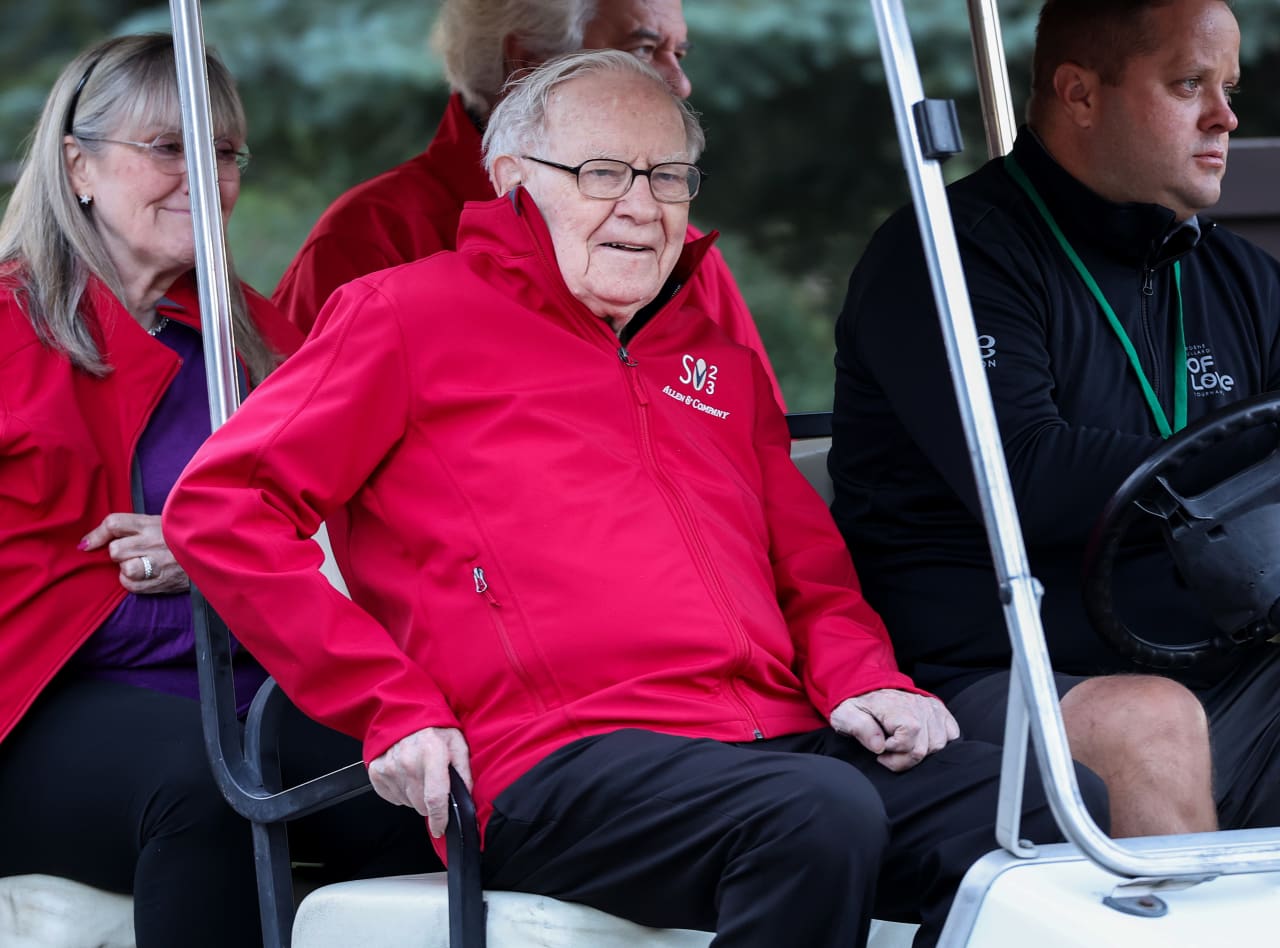Warren Buffett Donates Another $1 Billion. He Has Estate-Planning Advice for Everyone.
Four family foundations will receive shares worth more than $1 billion
At age 94, Warren Buffett is reflecting on life, wealth and mortality.
The legendary investor’s company, Berkshire Hathaway , said Monday that Buffett will again give a portion of his Berkshire shares, in this case worth about $1.15 billion, to four family foundations. The donations leave him holding 206,363 Class A shares worth about $148 billion.
As he did last November, Buffett is converting 1,600 Class A shares into 2.4 million Class B shares, which hold less voting rights, before donating them to the Susan Thompson Buffett Foundation, named for his late first wife, and to foundations led by his children.
The Thanksgiving-time donations supplement annual gifts to the four foundations, as well as to the Bill & Melinda Gates Foundation, that Buffett has made since 2006, when he unveiled plans to make major gifts throughout his lifetime.
In a message accompanying Monday’s news of the donations, Buffett discussed his plans for his three children, Susie, Howard and Peter Buffett , to distribute the Berkshire shares he owns at his death. Buffett told The Wall Street Journal in June that the Gates Foundation had no money coming after he dies.
The three Buffett children, now in their 60s and 70s, will need to decide unanimously what philanthropic purposes their father’s money serves. Buffett said in his new comments to shareholders that the requirement will give his children some degree of protection from an expected bombardment of requests.
“Those who can distribute huge sums are forever regarded as ‘targets of opportunity,’ ” Buffett wrote. “This unpleasant reality comes with the territory. Hence, the ‘unanimous decision’ provision. That restriction enables an immediate and final reply to grant-seekers: ‘It’s not something that would ever receive my brother’s consent.’ And that answer will improve the lives of my children.”
Buffett wrote that while potential successor trustees have been chosen, he hopes that Susie, Howard and Peter Buffett are themselves the ones to distribute all of his assets.
“I know the three well and trust them completely,” he wrote.
Buffett’s huge position in Berkshire means a rapid selling of his stock could jolt the share price. He wrote that his children should distribute his holdings gradually, and in a manner that “in no way betrays the exceptional trust Berkshire shareholders bestowed upon Charlie Munger and me.”
Buffett offered a suggestion for all parents, wealthy or not: “When your children are mature, have them read your will before you sign it.” He said it is better for children to be able to ask questions when a parent is still able to respond.
In discussing his fortune, Buffett, ever the teacher, highlighted the importance of compounding, especially after many years of investing.
“The real action from compounding takes place in the final twenty years of a lifetime,” he wrote. “By not stepping on any banana peels, I now remain in circulation at 94 with huge sums in savings—call these units of deferred consumption—that can be passed along to others who were given a very short straw at birth.” undefined undefined Berkshire’s Class B shares have rallied 34% this year, compared with a 26% gain by the S&P 500. Earlier this year the company joined a small club of U.S. businesses worth more than $1 trillion.
 Copyright 2020, Dow Jones & Company, Inc. All Rights Reserved Worldwide. LEARN MORE
Copyright 2020, Dow Jones & Company, Inc. All Rights Reserved Worldwide. LEARN MORE
A long-standing cultural cruise and a new expedition-style offering will soon operate side by side in French Polynesia.
The pandemic-fuelled love affair with casual footwear is fading, with Bank of America warning the downturn shows no sign of easing.
The pandemic-fuelled love affair with casual footwear is fading, with Bank of America warning the downturn shows no sign of easing.
The boom in casual footware ushered in by the pandemic has ended, a potential problem for companies such as Adidas that benefited from the shift to less formal clothing, Bank of America says.
The casual footwear business has been on the ropes since mid-2023 as people began returning to office.
Analyst Thierry Cota wrote that while most downcycles have lasted one to two years over the past two decades or so, the current one is different.
It “shows no sign of abating” and there is “no turning point in sight,” he said.
Adidas and Nike alone account for almost 60% of revenue in the casual footwear industry, Cota estimated, so the sector’s slower growth could be especially painful for them as opposed to brands that have a stronger performance-shoe segment. Adidas may just have it worse than Nike.
Cota downgraded Adidas stock to Underperform from Buy on Tuesday and slashed his target for the stock price to €160 (about $187) from €213. He doesn’t have a rating for Nike stock.
Shares of Adidas listed on the German stock exchange fell 4.5% Tuesday to €162.25. Nike stock was down 1.2%.
Adidas didn’t immediately respond to a request for comment.
Cota sees trouble for Adidas both in the short and long term.
Adidas’ lifestyle segment, which includes the Gazelles and Sambas brands, has been one of the company’s fastest-growing business, but there are signs growth is waning.
Lifestyle sales increased at a 10% annual pace in Adidas’ third quarter, down from 13% in the second quarter.
The analyst now predicts Adidas’ organic sales will grow by a 5% annual rate starting in 2027, down from his prior forecast of 7.5%.
The slower revenue growth will likewise weigh on profitability, Cota said, predicting that margins on earnings before interest and taxes will decline back toward the company’s long-term average after several quarters of outperforming. That could result in a cut to earnings per share.
Adidas stock had a rough 2025. Shares shed 33% in the past 12 months, weighed down by investor concerns over how tariffs, slowing demand, and increased competition would affect revenue growth.
Nike stock fell 9% throughout the period, reflecting both the company’s struggles with demand and optimism over a turnaround plan CEO Elliott Hill rolled out in late 2024.
Investors’ confidence has faded following Nike’s December earnings report, which suggested that a sustained recovery is still several quarters away. Just how many remains anyone’s guess.
But if Adidas’ challenges continue, as Cota believes they will, it could open up some space for Nike to claw back any market share it lost to its rival.
Investors should keep in mind, however, that the field has grown increasingly crowded in the past five years. Upstarts such as On Holding and Hoka also present a formidable challenge to the sector’s legacy brands.
Shares of On and Deckers Outdoor , Hoka’s parent company, fell 11% and 48%, respectively, in 2025, but analysts are upbeat about both companies’ fundamentals as the new year begins.
The battle of the sneakers is just getting started.
Three completed developments bring a quieter, more thoughtful style of luxury living to Mosman, Neutral Bay and Crows Nest.
The era of the gorgeous golden retriever is over. Today’s most coveted pooches have frightful faces bred to tug at our hearts.























